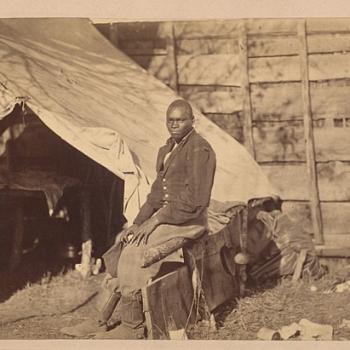One of the most popular songs in American history has the following line: “My sin, O the bliss of this glorious thought, my sin not in part but the whole is nailed to the Cross and I bear it no more . . .” Americans no longer get to the end of the line. We are being taught to say: “My sin, O the bliss of this glorious thought!”
If not careful, we are more ashamed of our shame than the just cause of our shame. If only we could glory in our shame, then the wages of sin would be happiness . . . at least we hope. Most of the world looks on in horror and wishes they could avert their eyes from our belching forth our decadence in high-def. Whether it is our belief that buying stuff will make us happy or our over consumption of everything, we stand at our “Word’s End” and proclaim we just want to be free to have fun.
Recently, an atheist told me he did not need religion, because religion simply solved problems that religion created. He did not need redemption from “sin,” because there was no “sin.” Now this atheist, to his credit, believes in morality: he is careful to proclaim a strong moral code, though his attempt to justify it from science is doomed to failure.
“Is” will never give him an “ought.” But pretend that irrationally clinging to a moral code pasted together from pop-science and the Democratic Party Platform and dimply remembered Christianity is coherent.
What happens when he (or anybody else) breaks their own moral code, not just a little bit, but smashes it all to pieces? Is peace possible? Is redemption? The relief of “no gods no masters” is either short lived or morally dangerous. If I am alone in creating my morality, I am the only one who can forgive myself. In some, perhaps most of us, this will lead to cheap grace, but for the more morally upright will come the doom of guilt with no mechanism for redemption.
Death will not end the guilt of such an atheist, it lives after him, only his awareness of that guilt in oblivion.
But the small group that can convince themselves there is no external morality and no God will never appeal to most humans, because best reason combined with experience will show most of us that there exists a moral law of Nature and Nature’s God. This is bad news, because it means we cannot just poll for morality, but good news because we cannot just poll for forgiveness.
No crime is beyond redemption if there exists an omnipotent Lawgiver. No cabal or person is so powerful as to be beyond the final judgment of God. You cannot buy off the High Court of Heaven or humor it into relaxing the standards. What happens after humans run out of time and face this judgment?
The temptation is to lower our moral aspirations: I look at myself and am not brave enough for absolute love. I twist the words of Jesus and hope that if I judge nothing, then nothing will be judged. What this cannot stop is the just voice, the small unstoppable voice of conscience. The dying West does not need Pope Francis to judge us, he is to aware of the complexities of each soul and culture, to do so. The West knows our decadence and fears our impotence in the face of virulent evils, but even more our condemnation in the pages of history.
There is another way open to me: putting myself in the position of the prodigal and running home to God the Fathers House. My focus then changes from my own sins (or worse those of others!) to the healing, hope, and forgiveness that is possible. Of course, all this means I cannot pretend the pig stye in which I sit (whether the pig stye of my gluttony or my disordered desires) is a pig stye and not a positive choice.
I must go from saying: “My sin, O the bliss.” to seeing it “nailed to the Cross.” For me at least, this process (still on going) has been both painful and full of the bliss of redemption. My sins? I see them, but my Redeemer lives!
This is good news, but it begins in bad news. My day starts when I stop having “self-esteem” or being positive about my condition. I pray today: “Lord Jesus Christ, son of God, have mercy on me, a sinner.” And to this I can testify: the bliss that follows when I make this admission is worth any “sacrifice” of my sin.
My sin? O the bliss of this glorious thought! My sin not in part but the whole is nailed to the Cross and I bear it no more! It is well, it is well with my soul.












